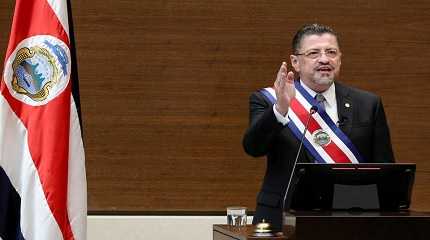
SAN JOSE, May 16 (Reuters) - The number of Costa Rican institutions hit in a wave of cyber attacks in the past month has grown to 27, President Rodrigo Chaves said on Monday, in one of the earliest challenges to face the new leader during his first month in office.
He added that nine of the institutions struck, mostly government agencies, are considered "very affected."
The attacks have had an "enormous" impact on foreign trade and tax collections in the Central American country, Chaves acknowledged in comments to reporters barely a week after he was sworn in as president.
In mid-April, outgoing President Carlos Alvarado's government reported hacker attacks on the country's finance ministry, which spread to other state institutions after authorities refused to pay a $10 million ransom demanded by the Russian hacker group Conti.
"We are at war and that is not an exaggeration," Chaves said at his inauguration on May 8, as he announced a national state of emergency.
Chaves did not provide an updated list of institutions targeted by the hackers.
Speaking at the same news conference, Science and Technology Minister Carlos Henry Alvarado said the governments of Israel, the United States and Spain have provided assistance to help protect Costa Rican computer systems and repair the damage.
The full extent of the damage is not yet known, Alvarado said.
The attacks have forced the finance ministry to deactivate Costa Rica's tax collection systems, although a substitute platform has allowed some customs transactions to go forward, Chaves said.
The president also accused fellow Costa Ricans of "betraying the country," and the previous administration of concealing information about the attacks, saying that there were signs that some locals were collaborating with hackers.




